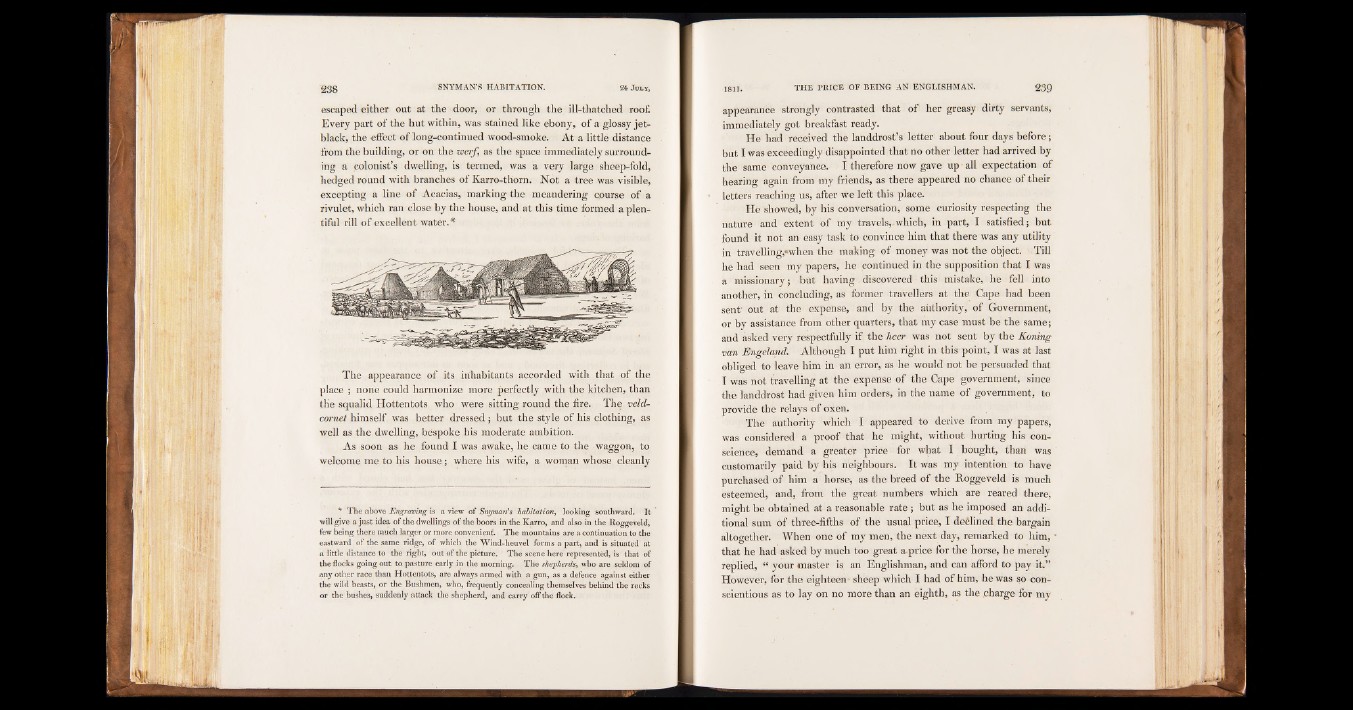
escaped either out at the door, or through the ill-thatched roof.
Every part of the hut within, was stained like ebony, of a glossy jet-
black, the effect of long-continued wood-smoke. At a little distance
from the building, or on the werf, as the space immediately surrounding
a colonist’s dwelling, is termed, was a very large sheep-fold,
hedged round with branches of Karro-thorn. Not a tree was visible,
excepting a line of Acacias, marking the meandering cpurse of a
rivulet, which ran close by the house, and at this time formed a plentiful
rill of excellent water.*
The appearance of its inhabitants accorded with that of the
place ; none could harmonize more perfectly with the kitchen, than
the squalid Hottentots who were sitting round the fire. The veld-
comet himself was better dressed; but the style of his clothing, as
well as the dwelling, bespoke his moderate ambition.
As soon as he found I was awake, he came to the waggon, to
welcome me to his house; where his wife, a woman whose cleanly
* The above 'Engraving is a view of Sni/man’s habitation, looking southward. It
will give a just idea of the dwellings of the boors in the Karro, and also in the Roggeveld,
few being there much larger or more convenient;. The mountains are a continuation to the
eastward of the same ridge, of which the Wind-heuvel forms a part, and is situated at
a little distance to the right, out of the picture. The scene here represented, is that of
the flocks going out to pasture early in the morning. The shepherds, who are seldom of
any other race than Hottentots, are always armed with a gun, as a defence against either
the wild beasts, or the Bushmen, who, frequently concealing themselves behind the rocks
or the bushes, suddenly attack the shepherd, and carry off the flock.
appearance strongly contrasted that of her greasy dirty servants,
immediately got breakfast ready.
He had received the landdrost’s letter: about four days before ;
but I was exceedingly disappointed that ho other letter had arrived by
the same conveyance. I therefore now gave up ■ all expectation of
hearing again from my friends, as there appeared no chance of their
letters reaching us, after we left this place.
He showed, by his conversation, some curiosity respecting the
nature and extent of my travels,-which, in part, I satisfied; but
found it not an easy task to convince him that there was any utility
in travelling,»when the making of money was not the object. Till
he had seen my papers, he continued in the supposition that I was
a missionary; but having . discovered this mistake, he fell into
another, in concluding, as former travellers at the Cape had been
sent’ out at the expense, and by the authority, of Government,
or bv assistance from other quarters, that my case must be the same;
and asked very respectfully if the heer was not sent by the Koning
van Engeland. Although I put him right in this point, I was at last
obliged to leave him in an error, as he would not be persuaded that
I was not travelling at the expense of the Cape government, since
the landdrost had given him orders, in the name of government, to
provide the relays of oxen.
The authority which I appeared to derive from my papers,
was considered a proof that he might, without hurting his conscience,
demand a greater price for what I bought, than was
customarily paid by his neighbours. It was my intention to have
purchased of him a horse, as the breed of the Roggeveld is much
esteemed, and, from the great numbers which are reared there,
might be obtained at a reasonable rate ; but as he imposed an additional
sum of three-fifths of the usual price, I declined the bargain
altogether. When one of my men, the next day, remarked to him,
that he had asked by much too great a price for the horse, he merely
replied, “ your master is an Englishman, and can afford to pay it.”
However, for the eighteen' sheep which I had of him, he was so conscientious
as to lay on no more than an eighth, as the .charge for my